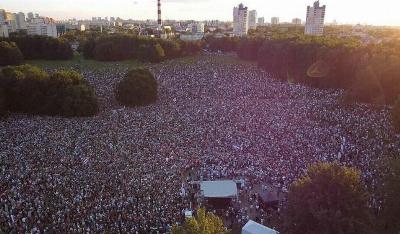Share
Human Rights Voices
While the UN devotes its human rights operations to the demonization of the democratic state of Israel above all others and condemns the United States more often than the vast majority of non-democracies around the world, the voices of real victims around the world must be heard.
Belarus, August 9, 2021
Belarus regime steps up ‘purge’ of activists and media
Original source
Aleysa Ivanova wakes up each morning wondering when the knock on her door will come.
“You understand you can be next. Every day I wake up, I think ‘maybe it’ll be tomorrow, maybe today. Maybe they’ll come for me this evening’,” said Ivanova (not her real name).
As a journalist in Belarus, her reporting on the country is seen as a threat to the regime of Alexander Lukashenko. Ivanova said the repression had increased in recent weeks, with reports every day of someone else being detained by state security forces.
Since July, there has been a state-sponsored obliteration of civil society and media organisations across Belarus, activists have said.
Between 14 and 16 July, there were more than 60 searches of the homes and offices of Belarusian human rights organisations and their staff, including Viasna, Human Constanta, Legal Initiative, as well as the Belarusian Helsinki Committee, the Belarusian Association of Journalists and many others. Documents and IT equipment, including laptops, mobile phones and computers, were seized during searches.
Earlier, on 8–9 and 16 July, the authorities also raided the homes and premises of independent media outlets and their staff and detained several journalists. More than 30 media workers and dozens of bloggers remain in prison.
By 23 July, Amnesty International reported that at least 46 human rights and other civil society organisations in Belarus had been shut down. Activists now say about 100 organisations have had to close.
“This is much bigger than just a crackdown,” said Tanya Lokshina, at Human Rights Watch. “At a government meeting on 22 July, President Lukashenko unapologetically described the move to shut down dozens of civil society groups as ‘a purge’ – and that’s what it is, a vicious large-scale mop-up operation aimed at eviscerating critical voices.”
Over the last year, according to the International Federation for Human Rights (FIDH) and Viasna, a Belarusian organisation documenting torture, at least 35,000 peaceful protesters have been detained, there have been 4,691 documented criminal court cases, 608 political prisoners and about 1,800 reports of torture. Hundreds of human rights activists have been persecuted and thousands have had to flee the country.
Ilya Nuzov, head of FIDH’s eastern Europe and central Asia desk, said this worsening repression had probably been in the works for months. “It’s not just all of a sudden. [The authorities] have been preparing diligently. It’s a natural progression of a deteriorating situation of human rights in the country.”
In the face of such persecution, some human rights organisations, whose staff managed to flee, are continuing their work abroad in the neighbouring countries of Lithuania, Poland and Ukraine. They remain defiant despite the grim outlook.
Victoria Fedorova, a human rights lawyer, and director of Legal Initiative, fled from Belarus in March after one of her colleagues was detained and his house was searched. She knew she would be next. She is now in the Ukrainian capital, Kyiv, but realises she is not safe there.
Vitaly Shishov, who headed Belarusian House, an organisation that helped his compatriots escape, was found dead on Tuesday, hanging from a tree in a Kyiv park in what police are now treating as a murder investigation.
“Even when we fled in March, we understood Ukraine is not safe,” Fedorova said. “We know security forces from Belarus can kidnap people. The plane hijacking [when a Ryanair flight was forced to land in Minsk so the leading opposition activist and journalist Roman Protasevich could be detained] was very scary because the regime showed total disrespect for international and national law. They can do anything to detain dissidents.”
The home of Natallia Satsunkevich, who works for Viasna, was raided in February while she was on holiday in Egypt. She did not return to Belarus and is based abroad now. Seven of her colleagues have been detained. She said the conditions in the jail were now so bad that they were akin to torture.
“There is no shower, you can’t go for walks. You sleep on a metal bed with no pillow.”
There were other activists still working secretly in Belarus but in the current climate of mass arrests, they were scared, she added. “All day they are in a nervous state but at the same time these people are really brave and will not stop.”
She added: “We will continue to work for all those people who need our help and for our colleagues who are imprisoned.”
Ivanova had her journalist’s accreditation cancelled last year but has carried on with her work. Many of her colleagues have fled the country or are in detention. She watches for strange cars outside her window and posts nothing on social media. Life at the moment was “depressing”, she said.
“Right now, it’s very hard and it’s getting worse and worse. They arrest people every day,” she said. “There’s no stop in the repression.
“I understand that maybe they will come for me but I want to stay in Belarus and work there. I’m trying to do my best to make the situation better.”

